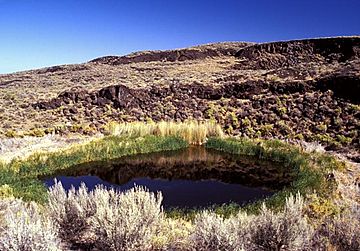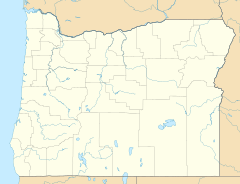Diamond Craters facts for kids
Quick facts for kids Diamond Craters |
|
|---|---|

Malheur Maar, the only lake-filled maar in Diamond Craters
|
|
| Highest point | |
| Elevation | 4,707 ft (1,435 m) |
| Geography | |
| Location | Harney County, Oregon, U.S. |
| Parent range | Basin and Range |
| Topo map | USGS Diamond Swamp |
| Geology | |
| Age of rock | 7320 to 7790 calendar years. B.P. |
| Mountain type | Volcanic field / shield volcano |
| Climbing | |
| Easiest route | roads and trails |
The Diamond Craters is a special place in Oregon, about 40 miles (64 km) southeast of Burns. It's a volcanic field, which means it's an area with many different volcanic features. This field covers about 27 square miles (70 km²). You can find lava flows, cinder cones (cone-shaped hills made of volcanic rock), and maars (wide, flat-bottomed craters). Scientists believe the volcanoes here erupted between 7,320 and 7,790 years ago.
How Diamond Craters Got Its Name
Diamond Craters and the nearby town of Diamond are named after the Diamond Ranch. A pioneer named Mace McCoy started this ranch in the area. His ranch used a special diamond-shaped brand for its cattle. This is how the name "Diamond" came to be used for the craters and the town.
Protecting Diamond Craters
In the 1970s, people started to worry about Diamond Craters. Some companies were taking large pieces of lava from the area. They wanted to sell these lava slabs to use on fireplaces or the outside of homes.
Scientists who knew the area well said that Diamond Craters was very important for research. They called it a "museum of basaltic volcanic features." They were worried that taking the lava would destroy this unique natural museum.
Because of its special value, Diamond Craters received extra protection in 1982. It was officially named an Outstanding Natural Area. This means it is a place with amazing natural features that are protected for everyone to enjoy and for scientists to study.
Volcanic Features You Can See
Diamond Craters has many different volcanic vents. A vent is an opening in the Earth's surface where volcanic materials like lava or ash come out. Here are some of the notable vents found in this area:
| Name | Elevation | Coordinates | Last eruption |
| Big Bomb Crater | 1,308 metres (4,291 ft) | - | - |
| Central Crater Complex | 1,378 metres (4,521 ft) | - | - |
| Cloverleaf Crater | - | - | - |
| Dry Maar | 1,268 metres (4,160 ft) | - | - |
| East Twin Crater | 1,326 metres (4,350 ft) | - | - |
| Keyhole Explosion Crater | - | - | - |
| Lava Pit Crater | 1,305 metres (4,281 ft) | - | - |
| Little Red Cone | - | - | - |
| Malheur Maar | 1,286 metres (4,219 ft) | - | - |
| Nolf Crater | - | - | - |
| Oval Crater | - | - | - |
| Red Bomb Crater | 1,323 metres (4,341 ft) | - | - |
| West Twin Crater | 1,326 metres (4,350 ft) | - | - |
 | George Robert Carruthers |
 | Patricia Bath |
 | Jan Ernst Matzeliger |
 | Alexander Miles |


